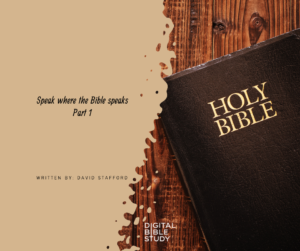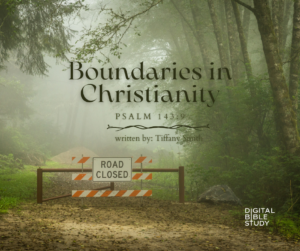Jonathan Jenkins
There is great divide between the biblical definition of faith and the manner in which most understand faith today. Merriam-Websters’ entry on faith includes the following usage: “firm belief in something for which there is no proof.”[1] It is that impression of the nature of faith which permeates our culture. Nearly every reference to faith in media and entertainment purposefully excludes the possibility that faith has any connection to reason. In our nation people of faith are portrayed as being opposed to reason and rationality. It is only the skeptic of things supernatural that has his life founded upon the “sure ground” of empirical evidence.
That construct of faith leads skeptics to claim the intellectual high ground of reason and rationality while speaking in disparaging tones about the fanciful and mythical teachings of Christians. However, Christians have not helped our case by the choice of language we use about faith. When we speak of “the leap of faith” or “stepping out on faith” or a dozen other such phrases, we further the thought that the hope of Christianity lies in a realm completely beyond evidence and proof. The sad part is that we have missed the clear Bible connection between faith and evidence.
True Faith Demands Evidence
The Bible teaches this simple truth about faith: “True faith demands evidence.” Faith only proceeds from an established truth. Faith is then revelatory in nature. Paul stated the case in this way: “So faith comes from hearing, and hearing through the word of Christ“(Romans 10:17). His argument is that faith comes after hearing. Faith is taught. It is created by the examination of a fixed set of truths set out in propositional form. In others words, faith is learned not felt. That is exactly what Paul told the Corinthians:
For I delivered to you as of first importance what I also received: that Christ died for our sins in accordance with the Scriptures, that he was buried, that he was raised on the third day in accordance with the Scriptures, and that he appeared to Cephas, then to the twelve. Then he appeared to more than five hundred brothers at one time, most of whom are still alive, though some have fallen asleep. Then he appeared to James, then to all the apostles. Last of all, as to one untimely born, he appeared also to me. (1 Corinthians 15:3-8)
Paul states his position which is that “Christ died for our sins.” He then provides the evidence to substantiate that case: Jesus rose from the dead. That is a statement of fact that he challenges his readers to falsify. His proof is the testimony of the eye-witnesses of the resurrection still walking the earth at the time of his writing. “Go ask them,” he challenges his audience. It is either the case that Jesus rose or it is not. Jesus is still in the tomb or He is not. Paul does not ask his readers to believe in Jesus because of the way He makes them feel. Paul challenges them to examine the evidence. His call to belief is not a “leap of faith” nor is it a “firm belief in something for which there is no proof.”
John follows Paul in that line of argumentation. In his account of the life of Christ he makes this statement:
Now Jesus did many other signs in the presence of the disciples, which are not written in this book; but these are written so that you may believe that Jesus is the Christ, the Son of God, and that by believing you may have life in his name. (John 20:30-31)
Evidence here precedes faith. “These are written that you may believe,” he says. That is the same statement as Paul’s argument that “faith comes by hearing.” John has made claims about what Jesus did. Those claims are statements of historical fact. Either Jesus did or did not do those things. His argument is that the signs that Jesus did in his life are sufficient evidence to prove his claim of divinity. The task he places on his reader is to examine the evidence. If John’s claims are an accurate description of the historical facts of Jesus’ life then they provide the evidence to substantiate his assertion. “Go and investigate” is the challenge of the gospel.
“These are written that you may believe,” only works if the “these” things that are written are true. If they are false or lies, then you cannot base faith upon them. That is the biblical standard of faith. Evidence – true evidence – first; faith afterwards.
Objective Faith
Faith is learned, not felt. When faith precedes feelings there is objectivity and rationality. When feelings precede faith there is subjectivity and emotionalism.
Biblical faith is grounded in the objective. The claims of Christianity are not portrayed as mythical. The pronouncement of the Bible is that the contents of its pages happened. Falsify the claims and Christianity crumbles. That is why the theism which comes from scripture is incompatible with the theory of macro-evolution. Either God did create the world in six days or He did not. If it can be proven that He did not do so, the God of the Bible is dead. No amount of linguistic gymnastics with Genesis 1 (The Day Age Theory, The Gap Theory, et al.) can change the truth of that claim. Such is the nature of biblical faith. Its claims are true and worthy of trust or they are at best meaningful myths or at worst manipulative and repressive lies. One’s feelings about that do not matter and cannot change the truth.
While faith is objective, it is also trusting. The theist cannot know, by a measurable fact, that something (someone) exists beyond the universe. However for the atheist, there is no fact within the material universe that will ever empirically exclude the existence of something or someone beyond the material. Often neither side wishes to admit it, but they are both in the same boat. Both are limited to examining the material and extrapolating from the evidence into unseen realms and/or times. Both then rely on a measure of trust. They trust that once the evidence is properly arranged and understood, it will point to a single reasonable conclusion. The theist sees design leading to a Designer. The atheist sees nature as sufficient to explain its own existence. Both need evidence to justify their beliefs.
It is ironic though that both parties will deny objective faith. The atheist proudly asserts that his “faith” is not faith at all. He proclaims, “It is fact. It is reason.” He claims that he only holds to those things that can be proven. Yet, if he wears the title of “atheist,” he necessarily asserts something he cannot prove. He asserts that he “knows there is no god.” He claims that he can prove that most universal of negatives. He cannot. The only way to know that there is no god is to know every fact about the universe. For if you lack only one fact in your knowledge of the universe, you cannot know that the one fact you are missing is that there is a god. In order to “know” that there is no god, one must know everything – he must become god. His “belief” that there is no god is not empirical. It is an extrapolation from the known facts into the facts that are unknown. It is objective, but it is still faith – whether he will acknowledge it or not.
Christians run from an evidence-based faith in another direction. For reasons that are not fully apparent to this author, we have a tendency to retreat into a feeling-lead faith. Some attribute their feelings to the work of the Spirit and others to providence. But both end in the same place. Our feelings validate our faith. We know that God is real because of how we feel in the face of trial or by the outcome of arbitrarily chosen events in our life. This basis of faith is well-expressed in the old Christian-hymn which says, “You ask me how I know He lives? He live within my heart.”[2]
It is a kind of faith that professes an unquestioning trust in God. In reality, it does not trust in God at all. What it really trusts in is self. It trusts that one’s feelings are always accurate. When one feels a certain way (good or bad) that must be an accurate representation of what God is wanting or doing. This faith taken to its logical end is little more than emotionalism, subjectivism, and wishful thinking. Few Christians ever take their faith fully to that end. But that is its end, even if we do not acknowledge it.
Faith: The Father of Hope
A true biblical faith starts with things that have been revealed. It is only when the underlying falsifiable claims have been validated that faith’s argument can proceed. And it must proceed for both the theist and the atheist. Our lives demand more than just the acquisition of knowledge. Humans have an intrinsic need to examine, explore, and grow. We must understand the “why” of our existence. Both the theist and the atheist are looking for something. It is the common lot of humanity to question and examine our own reality.
For the theist, God implies a purpose for our existence that lies outside of himself. God’s existence means that we must spend our lives seeking the purpose for which He created us. All creations exist to serve the purpose of their creators. The purpose then of the creation is to fulfill the purpose of the Creator. The wants and desires of the things created are of necessity of secondary importance to those of the Creator. Therefore, the search for meaning for the theist is one of self-denial.
However, if God is not real, there can be no purpose that is wholly external to us. True meaning can only come from within. In the end we may end up agreeing with others about the “why” and “how” of our lives, but the whole construct of good and evil can never be more than arbitrary and transient. Without God, we only have to please ourselves. The highest “good” that can be accomplished is to live a life that fulfills the desires that seem best to the person who holds them. The search for meaning for the atheist is one of self-actualization.
Yet, neither the theist nor the atheist has all of the answers. Even taken collectively, human knowledge and insight is finite. This limitation places in front of us a tempting short-cut. We can be enticed to abandon rationality and simply pick the outcome that we feel is the most meaningful for us. Are there theists who have chosen a “faith” in God because it is easier to believe in him? Do some believe simply because it is comforting to believe in life after death and/or that there is someone “out there” watching out for them? Surely, there are. Yet, are there not atheists who have chosen to reject the idea of any god simply because the thought of being accountable to higher being is deemed to be repressive and limiting? Surely, that is equally true. Assigning meaning to life out of the desire of one’s own heart is an easy approach to life. Yet, it offers little lingering benefit.
Our desire to discover our purpose or to assign one to our lives is a cry for hope. No person wants to go through his life with the sense that his time was wasted. We all feel the pull of hope. The human ambition to learn more, fly higher, run faster, earn more, and conquer even the universe itself is a testimony to this. We are not satisfied with the way things are. This need to be more and better is so strong that it has even caused us to abuse our fellow man. The Crusades and Inquisitions, led by “Christians,” sought to force men to the “higher calling” of Christianity. The Eugenics proponents of the last century sought to weed out of humanity those lagging behind on the evolutionary spectrum. Our striving to reach this perceived “perfection” has caused countless atrocities to humanity to be done in its name. Yet, despite our desire’s faults along the way, we keep striving for greater things. The theist and atheist both are committed to the thought that the answers are out there. Meaning, happiness, peace – or whatever you wish to call it – can be found. But it is painfully elusive. The easy path will never lead where we need to go.
There is a difference between feeling your next step will be better and knowing that it will be. The easy choice of walking the path of theism or atheism because it fits us better or feels better only creates a false hope. There are few things more dangerous than a false hope. It blinds us to reality and leads us into danger. Hope needs truth to be real. That means that our faith must come from truth. Faith is our conclusion drawn from facts. It is not a wish produced by our feelings.
True hope is the offspring of reasoned faith. The confidence of this kind of faith calls us to take another step in our journey because the preceding steps have been safe so far. That confidence repeated in our lives is hope. That hope grows stronger with each successful step. It keeps moving us closer to understanding the true purpose of why we are here and what is in our future.
Faith – A Call to Trust
“I’ll catch you,” a father says to his young daughter as he invites her to jump from her perch down into his arms. Even in her youth she has enough reasoning ability to know that if she falls she will get hurt. Her decision to jump or not jump is based on one thing: her trust in her father. His word said, “I will catch you.” Yet, she has never been in this exact circumstance before. She has never had to overcome this fear. She has never seen her father catch her from this height. Her next action is an action of faith. She either has more faith (trust) in her own insights and experiences or she has more faith (trust) in her father’s.
She can make either decision. Both would be rational. Both would be reasoned. Her instinct for self-preservation is accurately causing her to remain planted on her perch. Jumping without a sure and safe landing would be hurtful. Yet, in the person of her father, she sees a man that has never led her to harm before. In her short days of life, he has always been strong enough for her needs. She has never known his word to be false – ever. There is nothing irrational in the thought he is telling the truth.
Yet, both are also acts of faith. It is only the object of faith that differs. One places faith internally and the other externally. If she refuses to jump, she has placed her faith in her own perspective and understanding of the matter. She is trusting that she knows more than anyone else, even her father, about the outcome of her jumping. If she jumps it is a statement of trust in her father. It is a statement that admits that he knows more about the outcome than does she.
Trust is always a dangerous thing. Our trust can only be as strong as the evidence as it is based upon. The atheists trusts that his and humanity’s insight is all that is needed. Is that a safe place for trust? The theist trusts in an unseen God. Is the evidence strong enough for that to be a safe place for trust?
The answer to those questions is why faith must proceed from evidence. A better-felt-than-told faith is nothing more than a blind jump from our perch. Ultimately, one of the primary purposes of the Bible is to provide evidence that God will “catch us.” For example, Hebrews 11 is more than just a list of people of faith. It is a catalog of people that God caught as they jumped at His word. It is a testimony that our Father has the ability to keep us safe as we land in His arms. Their victory gives us reason to trust in ours. His commitment to them assures us of His focus on us. Hear then the words at beginning of this great chapter: “And without faith it is impossible to please him, for whoever would draw near to God must believe that he exists and that he rewards those who seek him” (v. 6).
So learn what can be learned; know what can be known; test what can be tested before you jump. God welcomes the investigation. If He is not strong enough to endure your examination, He is not strong enough to trust with your life. The only real faith starts with the search for truth. Real hope can only come from reasoned faith. Faith must always be a conclusion and never a feeling.
The Evidence of Faith
While the nature of faith in the lives of both the theist and the atheist is the same, the evidence supporting both systems is different. The atheist cannot allow for there to exist even one event in the history of the universe that cannot be explained through natural means. For him, there is nothing beyond the material.
That places him into a difficult position. Think of what must be held sacred in his life. He must use the laws of the universe to explain the creation of that same universe. Yet has he ever seen or documented the creation of matter? He must hold that the life that exists in the universe arose from non-living matter and energy within the universe. Yet has he ever seen or documented non-living matter produce life? He holds that matter has always existed and that life originated from non-life not based upon evidence, not based upon reason; he holds it based on a “leap of faith” that God does not exist.
Further, he must also disprove every claim of supernatural activity in human history. Every account in every culture expressed in any faith throughout all-time must be disproven. The atheist must hold that he knows better than the ancient historians and story-tellers of every ancient culture. He must believe that none of those ancient cultures could have properly preserved and understood the events of their day. His problem is that essentially every ancient culture believed in the supernatural. He must denigrate the intellect of every society before the rise of modern rationalism. If even one of those ancient “myths” is true, atheism dies. How can any atheist “know” that the collective testimony of all of the societies and cultures which pre-date him are completely wrong? Other than based on a pre-conceived bias against God, how can anyone definitely exclude the combined and consistent evidence of human history of the presence of the supernatural?
Conversely, the theist needs only one part of the universe to demand a supernatural explanation or for one event in the world’s history to point to an Actor beyond the material to know that God exists. If one particle of the universe demands a Designer; if one living-cell in the universe demands a Life-giver; if there is but one event in human history that can only be explained through the agency of supernatural influence, then the theist has a rational, reasoned, and evidentiary basis to conclude that God exists.
The Christian knows that such evidence exists. His evidence need not be tied to some expression of the ethereal presence of God in his life. While it is beyond the scope of this essay to delve into all of marks of God’s presence around us, the Christian does have many places to turn in his search for God. His existence is seen in the design of the universe. The Bible provides the evidence of its Divine authorship throughout its pages. Perhaps most powerfully, the established, historical fact of the resurrection of Jesus Christ is at the heart of the Christian faith.
Paul’s argument defending the resurrection is just as true today as it was in his day. Jesus did die. He did rise from the dead. His tomb remains empty until this day. No Jewish or Roman opponent of Jesus’ day ever produced His body or refuted the apostles’ testimony of the resurrection. No skeptic alive today will ever overturn the testimony of 2,000 years of investigation and proclamation of this truth. Jesus Christ lives today, not in the Christian’s heart. He lives, exalted, and enthroned with God (Acts 2:33; Hebrews 1:3). His life is the evidence which makes faith rational and reasonable. Your faith is not a leap into the darkness. It is the conclusion from the evidence of God’s presence in this world. Not only can faith be rational, but it is also the only rational conclusion from the evidence that surrounds us.
[1] “Faith.” Def. 2. Merriam Webster Online, Merriam Webster, n. d., Web. 16 April 2013.
[2] Ackley, Alfred H. He Lives. 1933. Word Music, LLC. 1961. Print.

Applications of Jesus’ Example Prayer
Prayer is such an important part of our Christian walk. It is our way of communicating with our Heavenly Father. So, do not neglect it. Pray to Him. Talk to Him. Use the aspects we identified in Jesus’ example prayer to guide you in your prayers.

Are We Speaking Where the Bible Speaks? Part 1
There is an important question that needs to be addressed, and that question is “Are we speaking where the Bible speaks?”

Boundaries in Christianity
Take a moment to think on areas of your life where you may already have boundaries set to help keep yourself closer to God. Also, take some time to consider areas of weakness that you may be able to develop boundaries for to help keep you distanced from tempting situations and more focused on sticking to the path of righteousness.

